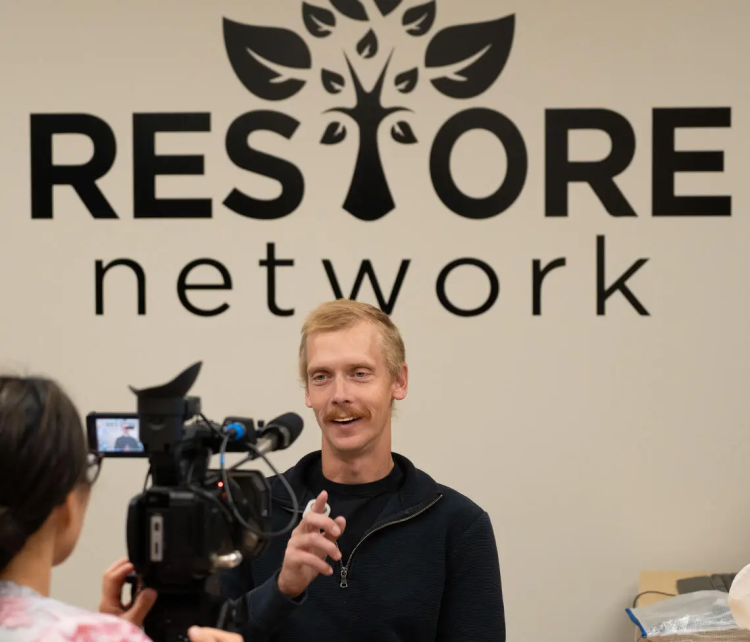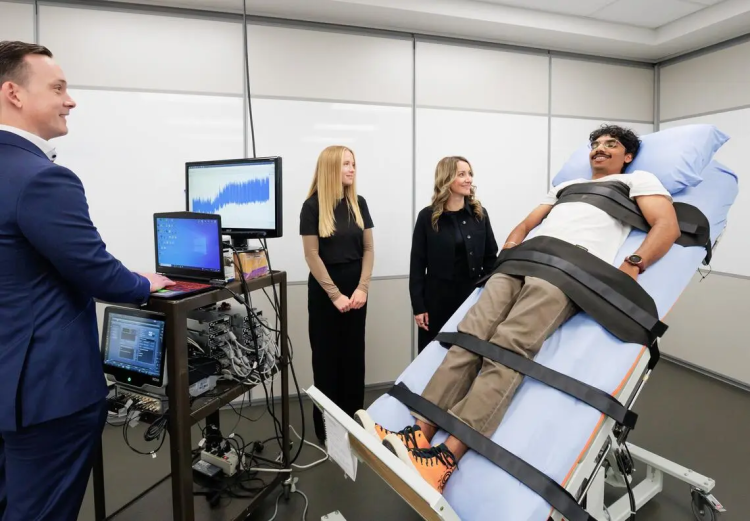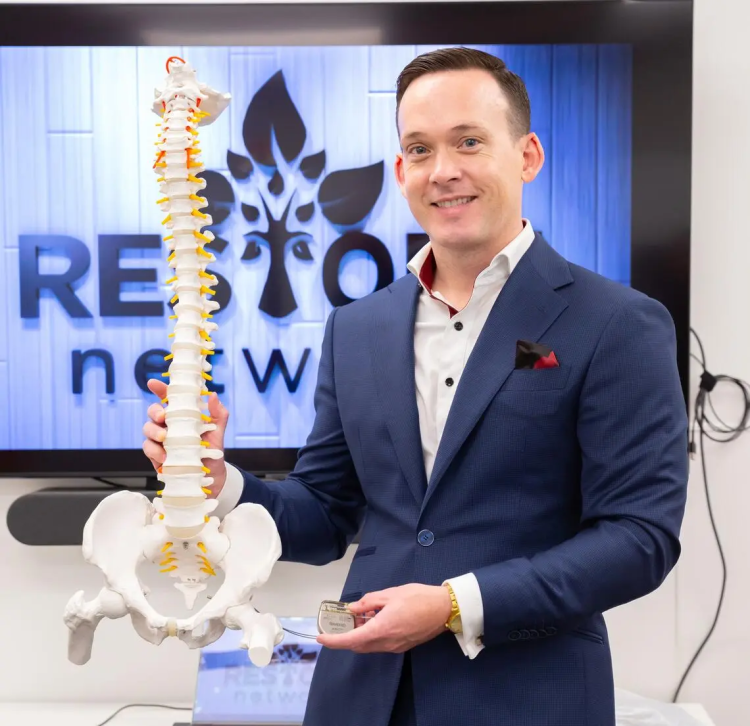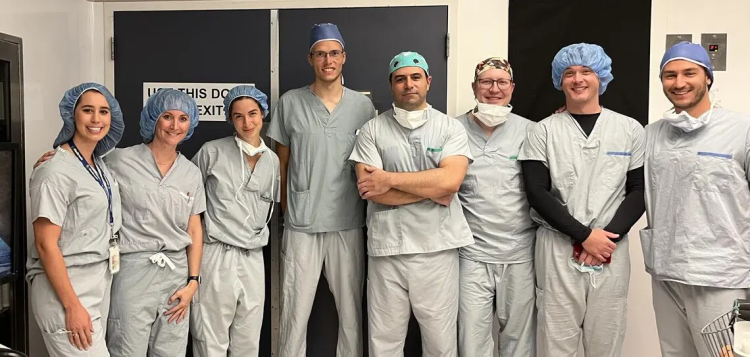Getting out of bed in the morning without the risk of passing out is a game-changer for 32-year-old Cody Krebs.
In 2022, Krebs experienced a severe spinal cord injury (SCI) in a motor vehicle accident. Since that time, Krebs requires the use of a wheelchair.

Cody Krebs speaks to the media in the Restore Network lab. Photo Credit: Quentin Collier
The damage to his spinal cord means his brain can no longer control blood pressure in his body. He was vulnerable to blood pressure drops where he was at risk of losing consciousness, and spikes placing him at risk of a heart attack and stroke.
However, an international clinical trial led by teams at the University of Calgary, École Polytechnique Fédérale de Lausanne (EPFL) and University of Lausanne (UNIL) in Switzerland, and Sint Maartenskliniek, Radboudumc, in the Netherlands has given him control again.
"Before the accident, I had no idea how volatile blood pressure can be. Just transferring from my bed to my chair almost knocked me out at times when my blood pressure would drop," says Krebs. "At other times during the day, my blood pressure would spike due to severe nerve pain, causing me to break out in a sweat and experience severe migraines."
Krebs is part of ongoing research at the University of Calgary based on a major discovery to stabilize blood pressure for people with SCI.

Aaron Phillips tests the new technology at UCalgary's Foothills Medical Centre. Photo Credit: Riley Brandt, University of Calgary
In a rare double publication in both Nature and Nature Medicine, a pair of landmark studies by Dr. Aaron Phillips, PhD, UCalgary, Dr. Grégoire Courtine, PhD, EPFL, and Dr. Jocelyne Bloch, MD, UNIL, describe the development of a targeted therapy to address blood pressure regulation in 14 participants across four clinical studies conducted at three separate medical centres in Canada, Switzerland, and the Netherlands.
Krebs and the other study participants now have an implantable system on their spine consisting of a new class of electrode arrays. These arrays connect to a purpose-built pulse generator similar to a cardiac pacemaker that delivers finely tuned electrical stimulation, calibrated to each person's needs. The result is a compact, adaptable system capable of restoring blood pressure stability through targeted neuromodulation that can be controlled through an app.

Aaron Phillips, director of the Restore Network, holds the new implant technology developed by his research team to restore blood pressure regulation for people with spinal cord injury. Photo Credit: Riley Brandt, University of Calgary
"Our mechanistic discoveries in Nature were crucial in bridging the gap from foundational neuronal mapping to clinical application. This synergy is what allowed us to move so quickly from theory to therapy," says Phillips, director of the RESTORE Network and associate professor at the Cumming School of Medicine. "The Nature Medicine study demonstrates several important factors. First, we show that low blood pressure after a spinal cord injury has serious medical consequences that must not be clinically ignored. Second, we show that our neuromodulation therapy for blood pressure instability after SCI can be deployed effectively in diverse clinical settings, at several centres in different countries with different medical protocols."
Phillips adds the Nature paper also showed that long-term use of the therapy treats not only the low blood pressure occurring after SCI but also prevents the development of life-threatening spikes in blood pressure.
"In the Nature study we were able to identify the entire neuronal architecture of the spinal cord that is responsible for uncontrolled, life-threatening elevations of blood pressure, called autonomic dysreflexia. We also showed that spinal cord stimulation can compete with this neuronal architecture to safely and precisely regulate blood pressure," says Courtine, director of NeuroRestore Center and professor at EPFL.

From left: Robyn Cameron, Kelly Larkin-Kaiser, Catherine Veilleux, Robin Demesmaeker, Fady Girgis, Kyle Rogan, Aaron Phillips and Nico Hankov.
The results were consistent in study participants across all sites: once activated, the system restored blood pressure to a functional range, often within minutes.
"Based on our experiences with this novel treatment, participants report experiencing less brain fog, having more energy, being able to speak louder, and suffering less from a postprandial dip. In addition, once the surgery was performed by neurosurgeon Erkan Kurt at Radboudumc, this system proved relatively easy to use in their home environment," says Dr. Ilse van Nes, MD, PhD, who successfully deployed the system at the rehabilitation centre Sint Maartenskliniek in Nijmegen, Netherlands.
"The international deployment shows that the surgery and therapy are safe and effective regardless of local practices. It's a key milestone toward making this technology widely available," says Bloch, neurosurgeon at Lausanne University Hospital.
While much of the focus in SCI care has been on restoring movement, a majority of patients live with chronic hypotension, a condition that leaves them exhausted, cognitively dulled, prone to fainting, and predisposes to cardiovascular disease over the long term.
"The implanted devices have a robust safety profile, as they are commonly implanted in the treatment of various pain disorders," says Dr. Fady Girgis, MD, neurosurgeon at the Foothills Medical Centre. "Therefore, it's an easy transition to implant them for this novel indication. We've seen very impressive and immediate improvements in blood pressure that are evident as soon as the device is turned on intra-operatively."
Krebs says he's proud to be in a clinical trial advancing discoveries in this field. "It feels good to be able to boost my blood pressure when I need to, I have more energy and am thinking more clearly. Also, there are fewer dangerous spikes in my blood pressure. I am very grateful for all the research being done."
The implantable neurostimulation system evaluated in these studies was developed by ONWARD Medical. ONWARD Medical has recently received FDA approval to initiate a pivotal trial of this therapy, which is expected to involve approximately 20 leading neurorehabilitation and neurosurgical research centres across Canada, Europe and the United States.
Grégoire Courtine and Jocelyne Bloch are co-founders and shareholders of ONWARD Medical, Aaron Phillips is a consultant and shareholder of ONWARD Medical. A series of patents on this technology were filed by the Canadian and Swiss teams. All scientific findings were independently peer-reviewed.
The research and team members were supported by several institutional, government, industry and philanthropic contributions. The lists are provided in the papers Nature, Nature Medicine. Part of the support for the Phillips Lab research for the Nature paper includes: University of Calgary Research Excellence Chair, Brain Canada, Digital Research Alliance of Canada, the Natural Sciences and Engineering Research Council of Canada; the Canadian Institutes of Health Research, Alberta Innovates Health Solutions, Campus Alberta Neuroscience, the Libin Cardiovascular Institute, the Hotchkiss Brain Institute, the Hopewell M.I.N.D. Prize, the Krembil Research Institute, the McCaig Institute for Bone and Joint Health, ONWARD Medical, Canadian Institutes of Health Research (Graduate Scholarship), the Branch Out Neurological Foundation and Eyes High Doctoral Scholarship and NSERC Brain Create to J.E.S.; Ambizione Fellowship to J.W.S. And, for the Nature Medicine paper includes: Canadian Institutes of Health Research, Cumming Medical Research Fund, Edith Rodie Estate, Hotchkiss Brain Institute and Libin Cardiovascular Institute.
Aaron Phillips is the associate dean (Innovation and Commercialization) and an associate professor in the departments of Clinical Neurosciences, Physiology and Pharmacology, and Cardiac Sciences at the Cumming School of Medicine (CSM). He is a member of the Hotchkiss Brain Institute (HBI) and Libin Cardiovascular Institute, at the CSM and director of RESTORE Network.
Fady Girgis is a neurosurgeon and associate professor in the departments of Clinical Neurosciences and Radiology at the CSM. He is also a member of the HBI at the CSM.










